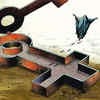01/5If your kid dislikes math, read this

Kids may dislike math for various reasons. Some find it challenging due to abstract concepts or complex equations. Others might lack interest if they don't see its relevance to their lives. Negative experiences, like pressure to perform or dull teaching methods, can also contribute. Additionally, the fear of failure or making mistakes can lead to avoidance. Math often requires patience and practice, which some may find tedious or overwhelming. Moreover, societal attitudes towards math as difficult or uninteresting can influence children's perceptions. Overall, a combination of factors, including difficulty, relevance, teaching methods, and societal perceptions, can contribute to kids disliking math.
02/5Study published in PLOS Biology finds a new way to increase fondness for Maths


A 2023 study has found an interesting way to make Math likable. Researchers from the Universities of Surrey and Oxford, Loughborough University, and Radboud University in the Netherlands, found that activating a brain region with electrical noise stimulation may improve mathematical learning in those who struggle with the subject.
03/5Impact of neurostimulation on learning


Researchers found that electrical noise stimulation over the frontal part of the brain improved the mathematical ability of people whose brain was less excited (by mathematics) before the application of stimulation. “Learning is key to everything we do in life – from developing new skills, such as driving a car, to learning how to code. Our brains are constantly absorbing and acquiring new knowledge. Previously, we have shown that a person’s ability to learn is associated with neuronal excitation in their brains. What we wanted to discover in this case is if our novel stimulation protocol could boost, in other words, this activity and improve mathematical skills,” says Professor Roi Cohen Kadosh, Professor of Cognitive Neuroscience and Head of the School of Psychology at the University of Surrey who led this project.
04/5Over 100 participants studied


In the study, 102 participants were recruited and their mathematical skills were evaluated using a series of multiplication problems. The participants were divided into four groups. One group, the learning group, received high-frequency random electrical noise stimulation while practicing multiplication. Another group, the overlearning group, practiced multiplication beyond the point of mastery with the same electrical noise stimulation. The remaining two groups, also consisting of a learning and an overlearning group, were exposed to a sham condition, which simulated the experience of real stimulation without applying significant electrical currents.
05/5How to make Maths interesting for kids?


Making math interesting involves incorporating fun and engaging activities that connect with real-life scenarios. Use games, puzzles, and interactive technology to transform abstract concepts into enjoyable challenges. Relate math problems to everyday situations, like shopping or sports, to demonstrate its practical applications. Encourage group work and discussions to foster a collaborative learning environment. Additionally, integrating visual aids, such as graphs and animations, can help students better understand complex ideas. By showing enthusiasm and presenting math in diverse, relatable ways, you can spark curiosity and make the subject more appealing.
Walking in morning vs walking during evening hours: Which is better?



























































closecomments
SIGN IN WITH
GoogleEmail